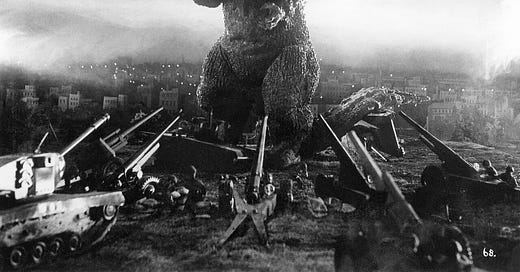Overview
I periodically find myself around discussions about the AI "Godzilla" trajectory—how big will it be? Will it be a villain or a hero?
Tyler Cowen has a great piece about "Why I think AI take-off is relatively slow."
It's an economic argument. The gist is that because AI is not a substitute for human productivity—it complements it—we're the weak link in the AI success story!
Highpoints:
Due to the Baumol-Bowen cost disease, less productive sectors tend to become a larger share of the economy over time. This already has been happening since the American economy originated... And the more effiicient AI becomes, the more this trend is likely to continue, which slows the prospective measured growth gains from AI...Human bottlenecks become more important, the more productive is AI...The O-Ring models makes AI hard to work with. The O-Ring model stipulates that, in some settings, it is the worst performer who sets the overall level of productivity...
He raises other points that also speak to the fragility of the human-AI relationship.
Noah Smith has a nice spin for the Baurmol-Bowen and O-Ring models:
Basically, this is the idea that many of the things humans do are complements to AI, rather than substitutes — AI will not simply be an autonomous god that does everything, but a technology that people use. The “O-Ring model”...It’s basically the idea that if there are even a couple things AI can’t do, then the growth boost from AI could be a lot lower than the optimists expect.
(My spin: the productivity gains of the AI-enhanced sectors will be offset by the less productive sectors).
These are great reads if you are econ inclined. They remind me of a headline I read recently: something to the effect that AI is short-term overestimated and long-term underestimated. That's one I agree with.
What is Bad Science Fiction?
BSF, or Bad Science Fiction, describes a collaborative software project on GitHub. As explained in the AI Advances articles, the project is so named because its ostensible goal is to develop a story analysis tool specializing in science fiction—a tool to be developed in collaboration with Generative AI. However, it is as much an experiment on how best to leverage large language models (LLMs) to amplify software.




